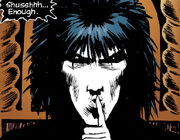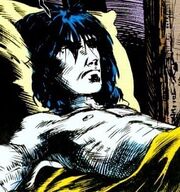No edit summary Tag: Visual edit |
No edit summary |
||
| Line 1: | Line 1: | ||
| − | [[File:Dream.jpg|thumb]] |
||
{{Quote |
{{Quote |
||
| quote = I walk across the dreaming sands under the pale moon: through the dreams of countries and cities, past dreams of places long gone and times beyond recall. |
| quote = I walk across the dreaming sands under the pale moon: through the dreams of countries and cities, past dreams of places long gone and times beyond recall. |
||
| Line 5: | Line 4: | ||
| source = Brief Lives |
| source = Brief Lives |
||
}} |
}} |
||
| + | {{Character |
||
| ⚫ | '''Dream''' is one of the seven [ |
||
| + | |image=Dream.jpg |
||
| + | |aka=*Morpheus |
||
| + | *Kai'ckul |
||
| + | *Sandman |
||
| + | *Oneiros |
||
| + | |occupation=Lord of dreams |
||
| + | |species=[[The Endless|Endless]] |
||
| + | |affiliation=[[The Endless]]}} |
||
| ⚫ | '''Dream''' is one of the seven [[The Endless|Endless]], who are powerful beings older than gods. He is both the personification, as well as the lord over all dreams and stories, and all that is not in reality (which, in turn, Dream may define by his existence). He has had many names such as Morpheus, Kai'ckul, '''Sandman''', and Oneiros. His appearance can change, depending on the entity looking upon him. He is described in [[Season of Mists]] as appearing to mortals as "''rake-thin, with skin the color of falling snow"'' and that he ''"casts a human shadow when it occurs to him to do so". '' |
||
==Appearance== |
==Appearance== |
||
Revision as of 15:29, 6 August 2020
"I walk across the dreaming sands under the pale moon: through the dreams of countries and cities, past dreams of places long gone and times beyond recall." ― Dream[src]
Dream is one of the seven Endless, who are powerful beings older than gods. He is both the personification, as well as the lord over all dreams and stories, and all that is not in reality (which, in turn, Dream may define by his existence). He has had many names such as Morpheus, Kai'ckul, Sandman, and Oneiros. His appearance can change, depending on the entity looking upon him. He is described in Season of Mists as appearing to mortals as "rake-thin, with skin the color of falling snow" and that he "casts a human shadow when it occurs to him to do so".
Appearance

Morpheus usually appears as a tall, thin man with bone-white skin, black hair, and two distant stars looking out from the shadows where his eyes should be. Most often they are silver, blue, or white, but when he becomes angered, they have been known to turn red.
Morpheus' appearance ranges widely "depending on who's watching." People generally perceive him as wearing a style of dress appropriate to their region and era. In the Dreaming, however, he is often seen wearing a grey tee-shirt and dark jeans. The people of Tales in the Sand's primordial African city see him as a starry-eyed African man. And although he is most often seen in human form, Morpheus appears as a giant black cat when speaking to the lonely cat-pilgrim of Dream of a Thousand Cats, and as a cat-headed god when addressing the Egyptian feline goddess, Bast . The Martian, J'onn, of the JLA, sees Morpheus as a Martian god in the shape of a flaming alien skull and identifies him as Lord L'Zoril, but Mister Miracle; looking at him simultaneously, sees Morpheus as a human. In Season of Mists, however, he appears in the same form to all the attending gods, and Bast comments, "I much prefer you in cat form, Dream old friend".
In The Dream Hunters, which is set in ancient Japan, Morpheus appears as a Japanese man to a Buddhist monk, and as a fox to a fox spirit. It is unclear whether Morpheus' appearance is determined by the expectations of onlookers, or if he chooses to manifest himself in different forms. He deliberately changes the style of his clothing to be less conspicuous when he visits the waking world as seen in Preludes and Nocturnes when he dealt with John Constantine.
He customarily wears a billowing black cape when abroad, sometimes with a flame motif or a pattern of dreamers faces. In battle he wears a helmet made from the skull and backbone of an enemy god whom he defeated. This helmet is also his sigil in the galleries of the other Endless; as well as appearing in the dreams (and at least once on the staircase wall) of Wesley Dodds. His face and dress resemble his creator, Neil Gaiman.
Speech

Morpheus' speech is usually portrayed as white text in black, wavy-edged speech bubbles bordered in white. The text is capitalized normally (sentence case) in stark contrast to other characters' speech; generally in block caps text. He has a formal manner of speech.
He almost never laughs out loud - or even smiles - but when he laughs, it is a disquieting sound, almost a growl.
Personality
Though ultimately a heroic character, Dream has many flaws. He has trouble catching sarcasm and jests, causing him to often appear cold and humorless. Dream can be insensitive, self-obsessed, and slow to forgive or forget what he perceives as slights. He has a long history of broken romances, and is shown, both directly and by implication, to be prone to harsh reactions when his relationships fail.

As Mervyn Pumpkinhead remarks after the end of one of Morpheus' romances, "He's gotta be the tragic figure standing out in the rain, mournin' the loss of his beloved. So down comes the rain, right on cue. In the meantime everybody gets dreams fulla existential angst and wakes up feeling like hell. And we all get wet."
There is a long-standing enmity between Morpheus and Desire, stemming from Desire's involvement in the breakup of one of Dream's romantic relationships (seen in Endless Nights).Near the end of the Brief Lives story arc, Desire says of Dream: "He's stuffy, stupid, and thinks he knows everything, and there's just something about him that gets on my nerves." Desire's self involvement, by definition, being even greater than Dream's.
It is implied that before his imprisonment he was in some ways colder and more blind to his flaws, and much of The Sandman is focused on Morpheus' desire to atone for his past behavior such as helping past lovers Calliope and Nada. Morpheus has great pride that does not tolerate damage or embarrassment, examples include banishing Nada to Hell for rejecting him, and being angry (originally) at the notion presented by Hob Gadling that he is lonely and needs friends.
Morpheus is constantly aware of his responsibilities, both to other people and to his realm. He is detailed and exacting in their fulfillment, as noted in Season of Mists, where Morpheus is described as, "Of all the Endless, save perhaps Destiny, he is most conscious of his responsibilities, the most meticulous in their execution." He shares a close, reciprocal bond of dependence and trust with his elder sister, Death. He consistently strives for understanding of himself and of the other Endless, but is ultimately defeated by his most tragic flaw: his inability to accept change. In The Wake, when asked by Matthew "Why did it happen? Why did he let it happen?", Lucien remarks, "Charitably... I think... sometimes, perhaps, one must change or die. And in the end, there were, perhaps, limits to how much he could let himself change."
Morpheus is noted in Season of Mists as "accumulating names to himself as others make friends, but he permits himself few friends." He is given more names in The Sandman than any of the other Endless, far beyond the many translations of Dream.
A very different version of Dream was shown in Endless Nights where he had a positive relationship with Desire and was very happy. However, this changes during the events of the story in Endless Nights.
Relationships
Dream has had a history of romantic involvements, all of which ended poorly for various reasons. Despite his cold exterior, Dream is often passionate and infatuated with his lovers. Whenever his respective relationships end, he is often crushed and goes into a state of depression. Very few of Dream's relationships are depicted in the Sandman Library, forcing readers to a great deal of speculation. Dream seldom mentions his past relationships, they usually are only mused upon by his servants or by his siblings.

Killala of the Glow
The most ancient of Morpheus' known relationships, the much younger Dream was in love with Killala and was vastly different, far more cheerful and outgoing. While Morpheus deeply loved Killala, she was uncertain of her feelings to him, and ultimately left him for Sto-Oa (her planet's sun) at a conference of universal manifestations. This event was initiated by the interference of Dream's sibling Desire. The events are implied to have changed Morpheus relationship with Desire and ultimately led to his less open personality.
Nada
A young African Queen of an ancient kingdom, Nada fell in love with Kai'ckul as he is known to her people. It was love at first sight for her after noticing him standing below her palace's window. She went on to search the world for him, at last discovering Kai'ckul in the Dreaming. Nada, hoever, changed her mind despite being deeply in love, once she realized that Kai'ckul was of the Endless. Being mortal, their love was forbidden. She turned Kai'ckul down but he disregarded her words, stating that he, too, loved her, and that no woman had ever sought him. He swore to make her his Queen. Nada, however, ran from Kai'ckul who chased her. Eventually the two consummated their relationship, only to discover the Sun destroyed Nada's kingdom in punishment for the improper coupling. Nada, ashamed, killed herself. Kai'ckul, however, followed her to the netherworld, and enraged by her rejection of him, he imprisoned her in Hell.
Years later Kai'ckul would see Nada in Hell, and he stated that while he still loved her, he did not forgive her, and refused to free her. Kai'ckul would relent when he was accused of being unjustly cruel to Nada by Desire, an opinion with which Death concurred. He then decided to return to Hell, only to discover that Lucifer had forsaken his kingdom and Nada was nowhere in sight. Nada had been taken by former Triumvir, Azazel, as a bargaining tool to reclaim Hell. Azazel challenged Dream to release Nada by going inside him, which he accepted, freeing Nada while imprisoning Azazel into a jar.
Kai'ckul apologizes half-heartedly to Nada, which she responds angrily to at first, but he becomes more sincere, and Nada forgives him. Kai'ckul again offers Nada the opportunity to be his queen but she turns it down, and he chooses not to relinquish his role as Dream of the Endless to be with Nada. Nada is instead reincarnated as a newborn baby. The baby possibly appears in this form at Dream's wake.
Calliope
A muse of poetry that was at one point married to Dream then called Oneiros. The couple lived separately as to make their meetings special. Calliope is the only known consort of Oneiros to have had a child with him. Their son, Orpheus, grew up in the Dreaming, where he was treated well by Dream, though a rift was beginning to form between Calliope and him by then. After Orpheus' wedding, the couple began to argue over Dream's cruel treatment of Orpheus, leading her to insult and leave him.
Calliope, while still in love with Oneiros, was not able to reconcile as the next time she returned to the Dreaming, the guardians of the gate pretended they did not know her. Calliope and Dream would not see each other for millennia, until 1989, in which he freed her from her imprisonment by Richard Madoc. Calliope offered to see him again, implying that their relationship could start again, but Dream brushed it off as a bad idea. She would later attend Dream's Wake, and spoke in the trio of his lovers, she regarded it more as remembering a friend than a lover, and out of gratitude for ending their son's misery.
Titania
The Queen of the Fae. Titania and Dream had a brief relationship.
Alianora
Alianora was sent to Dream by Desire upon his request for assistance in regaining his realm from the old gods who had taken it over and imprisoned him in his own palace. Little is known about the relationship between Dream and Alianora, now deceased. Alianora appears to have been Dream's lover once, but like all of Dream's relationships, it eventually soured. Her help in regaining his realm left a scar on her face, and Alianora foretold that he would receive his own scars, both physical and emotional, in turn.
She was also the recipient of one of Dream's 12 Dreamstones, the Rose-Quartz, as Morpheus tells Matthew in their last conversation. Dream is also known to have made a pact with her. He gave her a skerry of her own - one which he would eventually dismantle, long after she had died.
Thessaly
The last of Dream's lovers, Thessaly was the last of witches who had lived for thousands of years. Thessaly was not intimidated by Dream when they met in a skerry, and chastised his actions. Months later she, to her surprise, dreamed of the Dream Lord, which he had not expected or desired, yet the two had a long conversation that eventually led Dream to offer Thessaly a stay in the Dreaming. Dream quickly became hopelessly in love with Thessaly, though she did not truly feel likewise, and realized it when he stopped courting her, and resumed working. Thessaly left Dream, who did not attempt to convince her to stay. Dream was crushed by the break-up, and vainly hoped he would see Thessaly when he accompanied Delirium on her quest to see Destruction.
Thessaly and Dream met once later, when Dream was threatened by the furies who entered the Dreaming throughLyta Hall. Thessaly made a circle to protect Lyta making it impossible for Dream to kill the living body of Lyta in the waking world without breaking some sacred laws and serious consequences. Dream and Thessaly mused that she may have done so out of spite. Dream said that he never intended to hurt her, but she spitefully replied that he had regardless of intentions. Thessaly would to her surprise miss Dream's company and later said to Lyta that she wanted to kill her for killing Dream.
Thessaly attended Dream's Wake and funeral, speaking in a trio of Dream's lovers. She wept, breaking the promise that she would never shed another tear for him after leaving the Dreaming.
